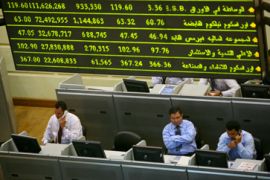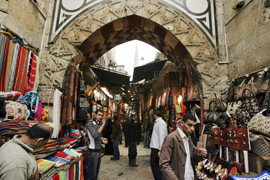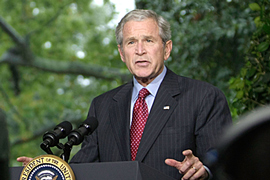Egypt hopes for US market revival
Analysts seek a US president who is equipped to solve the global financial crisis.

 |
| Egyptian analysts hope the US economy will stabilise and convince foreign companies to re-invest in emerging markets, such as Cairo’s CASE30 index [GALLO/GETTY] |
The financial downturn in US markets is redefining the way Egyptians view the US elections and helping to determine which candidate is likely to be perceived as most favourable to the Middle East.
In the days following the first election debate between Barack Obama and John McCain, the Democratic and Republican presidential candidates respectively, Egyptian media focused on the impact of the US financial crisis on local markets.
Keep reading
list of 4 itemsA flash flood and a quiet sale highlight India’s Sikkim’s hydro problems
Why is Germany maintaining economic ties with China?
Behind India’s Manipur conflict: A tale of drugs, armed groups and politics
The lead story in Al Ahram, Egypt’s oldest national daily and a government mouthpiece, cited the “rebellion in Republican ranks over the US bailout plan”.
A later edition of the paper highlighted the different economic positions of the candidates at the debates. “The financial crisis in the US became the priority during the first debate on foreign policy,” Al Ahram said.
Egyptian economists say they have been carefully monitoring the policies of both Democratic and Republican candidates ever since the US government stepped in and assumed control of mortgage giants Fannie Mae and Freddie Mac.
The subsequent demise of AIG, one of the largest global insurance companies, and Lehman Brothers and Merrill Lynch, two renowned investment banks, has rippled in international markets and fuelled fears that foreign investors could significantly decrease their holdings in Egypt.
Some analysts have predicted imminent stagflation – a period of rising unemployment and lack of economic growth – in local markets while others hope that the $700 bn bailout in the US could ease the financial turmoil in Egypt.
Manar Al-Shorbagy, an expert on US foreign policy, is not surprised that Egyptian media and analysts have given greater coverage to the financial crisis in the US in lieu of the race to the White House.
“The United States is the world’s only superpower and its internal politics affect Egypt and the whole world as much as its foreign policy does, particularly in light of the current financial crisis,” she told Al Jazeera.
Foreign policy focus
Traditionally, US foreign policy – with particular emphasis on how Washington approaches the Arab-Israeli conflict and other Middle Eastern issues – has played a key role in shaping Egyptian public opinion.
In the years after the 1979 Camp David Peace Accords, which brought together Israeli and Egyptian leaders under the auspices of the Carter administration, the US was seen as a superpower ally.
Ahmed El-Meslemany, a political analyst at Al Ahram, says it was in the 1980s, that interest in the US elections began to increase in Egypt.
“In the past, the interest in US elections was characteristic only of the intelligentsia. But, average Egyptians started to care about US elections after Reagan’s presidency,” he said.
But after the first and second intifadas in Palestine and the sanctions and subsequent invasion of Iraq, Egyptian public opinion became more hostile.
In the 2000 US elections, most Egyptians supported Al Gore, the then Democratic presidential candidate, because of the Clinton administration’s aggressive drive to seek a lasting Israeli-Palestinian peace treaty. The Clinton presidency, El-Meslemany says, “attracted much attention from the Egyptian public”.
Likewise in 2004, Egyptians hoped John Kerry, the Democratic candidate, could unseat George Bush, the incumbent president, who they blamed for the invasion of Iraq and the deteriorating situation in Palestine.
“Everyone had a clear-cut opinion about Bush, whether positive or negative. The second Gulf War is what made US elections even more popular in Egypt,” El-Meslemany told Al Jazeera.
“Egyptians are following the current elections because of the disasters Bush caused in the Middle East and because Obama, in my opinion, is the most appealing figure in America’s political history after Kennedy.”
Market meltdown
 |
| The Egyptian pound devalued by three per cent recently, causing fears of a greater dive [EPA] |
In 2008, however, the economic platforms of the Democratic and Republican candidates are now as likely as foreign policy to sway Egyptian public opinion.
Inflation rates hit 23.6 per cent in Egypt last month – a 16-year-high – and the purchasing power of the US dollar continued to suffer against European currencies.
On August 15, the Egyptian pound was trading at 5.29 to the dollar, its strongest level in nearly six years.
But one month later, as Washington sought ways to bail out the mortgage and banking markets in the US, the pound was devalued by three per cent, increasing fears that it could begin to dive if western economies do not resurface.
Egypt’s high inflation rate, devalued currency and overall negative economic outlook brought on by bad news in the US has pushed foreign investors to begin dumping their shares in the Egyptian bourse.
On September 25, foreign investors accounted for almost 50 per cent of that day’s transactions and were net sellers of Egyptian shares by more than LE 180 million ($33.02 million), dragging the market down.
On September 27, in an address to mark the end of Ramadan, Hosni Mubarak, the Egyptian president, said that Muslim countries – including Egypt – would be the most adversely affected by the US financial crisis.
Sherine El-Madany, a business analyst and journalist at the Daily Egypt News, believes the stability of Egyptian markets is directly affected by what happens at the New York Stock Exchange.
“The saying that when the US sneezes, the rest of the world catches a cold has proven correct these days more than ever and definitely applies to Egypt,” she told Al Jazeera.
El-Madany says that the collapse of US mortgage giants Freddie Mac and Fannie Mae followed by the Lehman demise and the sale of Merrill Lynch almost knocked out the Egyptian stock exchange.
“Over the summer, Egypt’s benchmark CASE30 index flashed the red alert, sessions swarmed with panic, and the stock movement bar glittered red all over, indicating stocks were sagging across the board,” she said.
“Most recently, the market plunged further, as talks over the $700 billion bailout plan to save the financial system hit a snag.”
Domino effect
 |
| Egyptian businesses hope local markets can rebound after the US financial crisis [GALLO/GETTY] |
A stock market crash in New York could fuel a recession in Egypt, the populist thinking goes, as dozens of foreign companies begin to pull out much-needed foreign currency from massive investment projects.
Brokerage firms in Egypt predict that the US financial downturn could reduce growth in foreign investment in the country by as much as 35 per cent.
Tariq Hussein, a Dubai-based financial analyst, says emerging markets, such as in the Middle East, are forced to bear the repercussions of the US financial downturn.
“There is no doubt that over the past five months, foreign investors have been aggressively fleeing our regions’ equity markets. Local markets need a sense of stability in the US market for then to recoup these losses,” he told Al Jazeera.
El-Madany says that the ripples of the US financial crisis are clearly reversing recent economic gains in Egypt.
Egypt’s central bank expects economic growth at 6 per cent, down from 7.2 per cent in 2007.
Egyptian investment firms have also pointed out that foreign direct investment (FDI) figures are also expected to fall in the face of the global financial turmoil.
“This comes as very bad news to the health of the Egyptian economy, as it heavily relies on FDI figures to sustain growth that currently represents around 9 per cent of gross domestic product,” El-Madany said.
Blaming the Republicans
 |
| Many Egyptians blame Bush for what they say has been economic mismanagement [GALLO/GETTY] |
Most Egyptians tend to blame what they term “eight years of Republican mismanagement” for the current turmoil in both domestic and international markets.
They trace the current crisis to the reaction of the US Federal Reserve immediately after 9/11 when interest rates were dropped in efforts to boost post-terrorism consumer spending and market growth.
Low interest rates allowed for cheap mortgages which consequently fed into a housing boom in the US and elsewhere, most noticeably in Egypt and the Middle East.
But what goes up can come down, and as the US Federal Reserve continued to lower rates in hopes of boosting a weakening US dollar, inflation continued unchecked, eventually leading to mortgage defaults and the sub-prime crisis with global impact.
“The world is facing many challenges today, such as economic crises and wars, which can be blamed on the Republicans,” El-Meslemany said.
He believes a Republican win in the White House will simply translate into a political and economic status quo.
“If McCain won the elections, what I call the ‘9/11 era’ will continue because an era ends only when its major figures make an exit from the political scene.”
El-Madany also believes most Egyptians see McCain as an extension of George Bush, the current US president, who they say “mangled the US financial system”.
“A common belief in Egypt is that the Republicans – embodied in George Bush – have tampered with the economy for eight years, making both rich richer as well as the poor poorer,” she said.
Obama or McCain?
Amr El-Shobky, an analyst at the Al Ahram Centre for Strategic Studies, sees the irony in that market instability caused by the Republican administration could derail their efforts to win a third term in the White House.
“There is no doubt that the current crisis is reducing McCain’s chances of winning the elections,” El-Shobky said.
But El-Meslemany believes that international markets could be buoyed if Obama wins the elections.
“Obama’s greatest achievement would be starting a new era. As an analyst, my preference is for Obama because he offers a new hope in a world that has reached a deadlock,” he told Al Jazeera.
In Egypt, markets are shifting towards support for Obama, who one investment banker said had the energy, charisma, and world vision “to do what it takes to save the US economy”.
Hussein, the Dubai-based analyst, believes that the next US president will be taxed with addressing what Alan Greenspan, the former chairman of the Federal Reserve, once coined as “once in-a-half-century, probably once in-a-century type of event”.
“Novmber’s winner will be the one that delivers, amongst several other issues, the best agenda and tools to deal with the current financial situation,” Hussein said.
“The Egyptian market favours – and badly needs – the US market to sort itself out, thus whetting the appetite of foreign investors, once again, towards the growth on offer in emerging markets,” he added.
But timing, good marketing and a dash of luck can always turn the tables on any poll numbers and election campaigns.
“I think Obama is lucky to run for president during this difficult economic downturn, whereas McCain is undoubtedly unlucky to run following Bush’s term,” El-Madany said.
With additional reporting by Dina Abdel Megeed in Cairo.